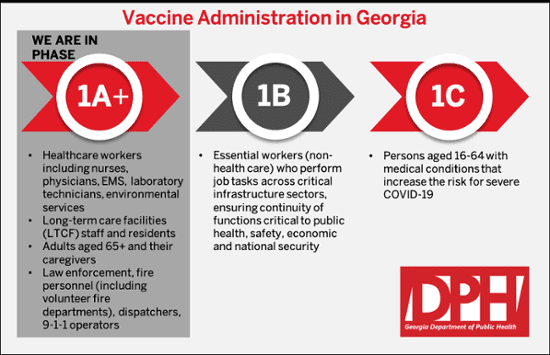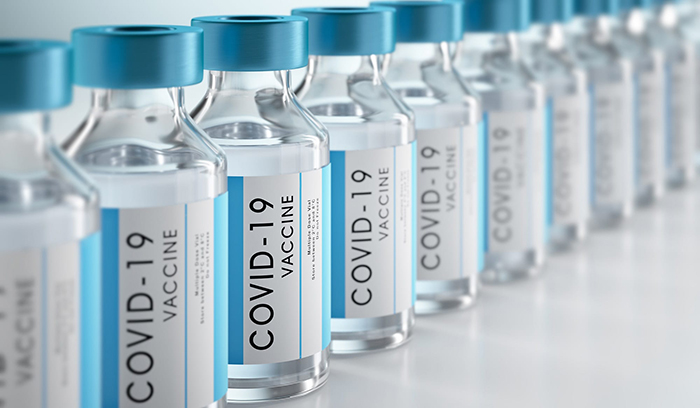Emory Transplant Center recommends that our patients receive the COVID-19 vaccine when it becomes available to you.
COVID-19 Vaccine Recommendation for Emory Transplant Center Patients
Understanding the COVID-19 Vaccine and the Transplant Patient
- Emergency Use Authorization (EUA) by the FDA is not the same as full FDA approval. EUA is a means to facilitate the availability and use of vaccines and other unapproved medications during a public health emergency, such as a pandemic.
- Without a vaccine, there is a risk of disease, long-term complications, and death. To date, transplant recipients appear to have clinically worse outcomes from COVID-19 when compared to non-transplant patients. This may be due to overall health status or to medications used to prevent rejection of the transplanted organ (being immunosuppressed).
- The recently approved Pfizer and Moderna vaccines are very similar with reported effectiveness of 94-95 percent. Both vaccines are mRNA-based and are not live viruses. However, the safety and effectiveness of the mRNA vaccines are still under investigation in solid organ transplant recipients, who were not included in the early studies. Based on previous vaccination guidelines for transplant patients, our doctors think the Pfizer and Moderna vaccines are safe and will offer a benefit to our immunosuppressed transplant recipients.
- Some future vaccines, which are not yet approved for use, may be weakened or attenuated live viruses. You should avoid these. We are currently advising the use of only the Pfizer and Moderna vaccines. If you are unsure, contact your transplant team for guidance.
- Lastly, heart transplant patients should check in with their heart transplant team PRIOR to receiving a COVID-19 vaccine.
- It is recommended that transplant antibody levels are checked before the first dose and one month after each dose is received.
- Vaccination is discouraged for organ recipients within the first three months of transplant or for those who have ongoing issues with rejection, but will be reviewed upon request.
- If you have. recently received other vaccines (influenza, shingles, etc.), you should wait one month before receiving the COVID-19 vaccine.
Nationally recognized transplant care
Learn about our transplant programs. Make an appointment online, find a provider or call 404-778-7777 to schedule an appointment.
COVID-19 Vaccination Expansion to Phase 1A+
The Georgia Department of Public Health (GaDPH) has expanded the COVID-19 vaccination eligibility to Phase 1A+ (those age 65 and older). See the below chart for a listing of who is eligible in the 1A+ grouping or visit the GaDPH website.

Emory Healthcare is offering vaccination appointments to existing Emory Healthcare patients age 65 and older. All COVID-19 vaccinations are by appointment only. Emory Healthcare patients who are age 65 and older can request a vaccination appointment via a web form posted on the Emory Healthcare website at emoryhealthcare.org/covid. Completing this form will place you on our waitlist, which Emory Healthcare will work through in a first-come, first-served process. When appointment time slots become available based on vaccine supply, patients will be contacted with instructions on how to make their appointment.
Please note, due to the high demand for the vaccine, it may take time (days or weeks, depending on vaccine supply) before we can contact you. The second vaccine dose will be scheduled after administration of the first dose. Individual physician offices will not have the vaccine and will not be able to schedule vaccinations.
You may also locate a local health department near you to schedule a vaccination at the GaDPH website.
In the meantime, please continue to follow best practices: Minimize going out in public, wear a mask when out of the house, and clean your hands frequently with sanitizer or soap and water.
Emory Healthcare COVID-19 Vaccine FAQs
To most efficiently address questions, we are regularly updating the Emory Healthcare website for answers to frequently asked questions about the COVID-19 vaccine at Emory Healthcare. Please visit the site before calling us.
Nationally recognized transplant care
About Emory Transplant
As one of the top 15 transplant centers in the nation, Emory Transplant is at the forefront of clinical excellence and pioneering new transplant therapies. Emory Transplant offers advanced technology and superior outcomes in heart, kidney, liver, lung and pancreas transplant surgeries. Emory Transplant Center, a part of Emory Healthcare, has performed more than 12,000 transplants. The center’s core mission is to provide exceptional care for patients in need of organ transplants while offering access to the latest advances in the field of transplant medicine.
Related Posts
-
 Emory Transplant Center is taking extraordinary steps to maintain the highest level of safety for patients, their families and staff during COVID-19.
Emory Transplant Center is taking extraordinary steps to maintain the highest level of safety for patients, their families and staff during COVID-19. -
 Emory Transplant Center offers telehealth to allow our patients to receive high-quality care from the comfort of home during the COVID-19 pandemic.
Emory Transplant Center offers telehealth to allow our patients to receive high-quality care from the comfort of home during the COVID-19 pandemic. -
 It's important to meet with a clinical nutritionist who can evaluate your diet and teach you the right foods to eat before and after transplant.
It's important to meet with a clinical nutritionist who can evaluate your diet and teach you the right foods to eat before and after transplant.
Recent Posts
-
Dec 3, 2025
-
Nov 17, 2025
-
Nov 14, 2025
-
Nov 10, 2025
-
Nov 4, 2025
-
Oct 31, 2025

